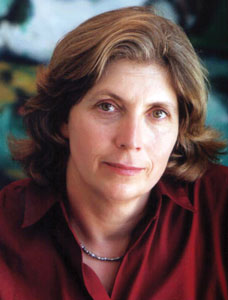 The battle for women’s rights in Israel has been making so much news recently it’s hard to keep track of the very latest. The woman who’s been at the forefront of this battle for many years now, Anat Hoffman, will be in Kansas City to talk about this and other issues on May 17, 18 and 19. (For details, see below.)
The battle for women’s rights in Israel has been making so much news recently it’s hard to keep track of the very latest. The woman who’s been at the forefront of this battle for many years now, Anat Hoffman, will be in Kansas City to talk about this and other issues on May 17, 18 and 19. (For details, see below.)
One of these battles, that of women being allowed to pray at the Western Wall, has intensified over recent months resulting in arrests when women prayed there. Last week, the Jerusalem District Court ruled that women in prayer shawls do not disturb the public order and should not have been arrested.
Hoffman, who is the executive director of the Israel Religious Action Center and an active member of the group known as Women at the Wall, said in a statement published by JTA, “Today Women of the Wall liberated the Western Wall for all Jewish people. We did it for the 8-year-old girl who can now dream of having her Bat Mitzvah at the Wall, and for the grandmother who cannot climb on a chair in order to see her grandson’s Bar Mitzvah. We did it for the great diversity of Jews in the world, all of whom deserve to pray according to their belief and custom at the Western Wall.”
Hoffman has not been fighting the battle for religious pluralism in Israel alone. One of the reasons she said she is coming to Kansas City is because of the efforts many members of this community have made to support the cause.
“The Kansas City Jewish community has made sure that Kansas City puts to shame all other cities in the United States for their support of rights in Israel,” Hoffman said.
There are four people in Kansas City that she calls a “nuclear blend” in helping promote these rights. She praises Rabbi Alan Londy for inviting her to Kansas City as The New Reform Temple’s Krasne scholar in resident.
“The Kansas City Jewish Community has the right to say what they think should be done in the Jewish state,” Hoffman said. “They have a duty. Zionism is not a spectator sport.”
She notes that Rabbi Arthur Nemitoff is a staunch supporter of a legal aid center for new olim fighting for conversion rights. Then there’s Rabbi Mark Levin, who fervently believes Jews in Israel should be able to have freedom of choice when it comes to marriage.
Last but not least there’s Bill Lowenstein, who champions the rights of women.
“He is giant fighting for women,” Hoffman said.
The crusade begins
Hoffman’s life and the issue of religious pluralism in Israel changed forever in 1988, when she was attending a conference with a group of women who simply wanted to pray at the Wall.
“I was just there because I own a folding table, and the hotel would not rent one to them,” she said, “that is how an historic moment occurs.”
Soon after, a group of women who eventually were called Women at the Wall gathered monthly at the Kotel for Rosh Hodesh services. Their desire to pray together, wearing tallit, caused the ultra Orthodox to attack them and try to keep them from praying. Nothing — court battles, arrests, media attention — kept the women away from the Wall.
Recently the balance changed. Just before the April 11 Rosh Hodesh service the Women of the Wall received a letter from Yossi Pariente, the chief of police of Jerusalem, telling them the attorney general said women cannot wear tallit, cannot read Torah and cannot say Kaddish at the Wall. It went on to say that police would enforce the law, Regulation 13, the Holy Places Law of 1924, which is punishable with six months in jail. They were told they could appeal that decision to the Supreme Court.
“We raised hell immediately,” said Hoffman in a recent phone interview. “How can it be that we cannot say Kaddish! What was amazing is that from around the world, not just in the English-speaking world, but all over, we got letters and protests. And the most amazing is that the chair of the Knesset Committee on Women also called the Rabbi of the Wall. And the rabbi backed down!”
From there things happened rapidly. Natan Sharansky, the chairman of the Jewish Agency, has introduced a plan to make the Kotel accessible to men, women and mixed groups. Then there was the arrest at the Wall on April 11 of five women, who were part of a group of 300 women, for praying while wearing tallit. Most recently came the court’s ruling that they should not have been arrested.
While Hoffman may be best known in the United States for her work with Women of the Wall, her efforts supporting women’s issues and religious pluralism goes beyond the Kotel. She runs the IRAC, the legal and political arm of the Reform Movement in Israel. Included in the organization’s five major goals are the recognition of Reform and Conservative conversion in Israel; freedom of choice in marriage; fighting against racism in Israel based on religion and race; and fighting for the equality of women.
In her role with IRAC Hoffman has led the way against women’s segregation on public busses. Their actions, along with the support of many Orthodox women, led to Supreme Court victories against such discrimination. Where once there were 2,500 segregated buses, there are now 500.
The IRAC has worked hard to get Reform and Conservative rabbis paid just as Orthodox rabbis are in Israel, taking the case all the way to the Israeli Supreme Court. The face of this fight so far has been Rabbi Miri Gold. Although the Supreme Court ruled that Rabbi Gold should be paid a salary, this has not yet happened. Hoffman, however, is confident she will eventually get paid.
“I think the state will soon be paying for 2013 and will also be paying damages,” she said. “Now we are arguing over 2012.”
Rabbi Gold is a strong supporter of Hoffman and her work.
“Anat has highlighted the fact that there is religious coercion in many sectors of Israeli society, and much of it sanctioned by the government,” said Rabbi Gold. “Often these issues are very connected to women’s issues, so it puts a spotlight on them and demands attention and solutions.”
“Whether it is Women of the Wall, segregated buses, young girls being harassed on their way to school, she, through the IRAC, puts these issues squarely on the table and she demands justice,” added Rabbi Gold. “She knows how to do these things cleverly, and she gets things done.”
“While my court case is not gender-based,” Rabbi Gold added, “it doesn’t hurt that it’s a woman in the spotlight demanding to be recognized as a rabbi by the government of Israel. No one in the government can offer solutions for men only in this case.”
It is these issues of women’s rights and the increased intolerance on the part of ultra Orthodox Jewish men that have raised many issues. Hoffman’s theory on why there is this tremendous frantic outpouring against women is intriguing.
“I think it has to do with Israel’s policy to exempt young men from the core curriculum. The (ultra Orthodox) man doesn’t study any life skills, any real world topics. He only studies Torah. He doesn’t know how to write checks and deal with the world. The wife is the one who knows because she is out in the world. She learned the core curriculum. She works. Because of this the status of women has risen in the ultra Orthodox community. So to keep women in check, came the idea of protected modesty.”
“They are saying, ‘You might think you are so smart, but your desires to wear red or your hair brings people to temptation.’ The modesty whip is used to keep women in check. You cannot see women, we will not even put photos of women in the newspapers,” she said. “The end result is that women are not feeling good about themselves anymore. They see their body as oozing sin. So it is a breaking down of confidence.”
Hoffman believes that ultra Orthodox men should not serve in the army. Instead they should do national service in education and health. “I don’t want people who are not educated to have a gun,” she said. “They would not know what is an illegal order because they have never studied civics, history and information about the country and democracy.” She is also concerned that it would change the role of women in the army.
Hoffman events at NRT, JCC open to the entire community
Anat Hoffman, executive director of the Israel Religious Action Center, will be in Kansas City the weekend of May 17-19 as the Krasne Scholar in Residence at New Reform Temple. The IRAC is the religious and political arm of Reform Judaism in Israel. Hoffman also has served as the chairman of Women at the Wall and previously served on the Jerusalem City Council for 14 years.
“There were several reasons why we invited Anat Hoffman as the Krasne Scholar. We wanted to do a program with something to do with Israel,” said Rabbi Alan Londy of New Reform Temple. “We wanted something that is directly connected to the Reform movement. And the issue of her being with the Women of the Wall all contributed to us making our decision.”
On Friday night, May 17, Hoffman will speak at 8 p.m. during services, on “From the Back of the Bus to the Top of the Agenda.” After a light breakfast on Saturday morning she will lead a Torah study at 9:15 a.m. on “The Critical Civil Rights Issues Facing the State of Israel.”
The community is invited to both events at New Reform Temple. Those wishing to attend the brunch on Saturday, need to make a reservation by calling 816-523-7809 by Monday, May 13.
“Anat Hoffman coming is a real important significance for New Reform Temple,” said Rabbi Londy, “because our leadership is very concerned with the issue of religious pluralism in Israel. We have a strong commitment in our congregation to nurture Reform Judaism in Israel. Her talk is very important to our religious and social agenda.”
In an effort to have her heard by as many people as possible, Rabbi Londy and New Reform Temple reached out to the community.
“We wanted to present to the community an opportunity for everyone to hear her,” said Rabbi Londy. “So the support of the rabbis and agencies was very important. I asked my colleagues to support this, and they did.”
With this successful effort, Hoffman will also be speaking at 7 p.m. Sunday, May 19, at the Jewish Community Center on “Religious Pluralism and the Future of the State of Israel.”
The program on Sunday night is co-sponsored by New Reform Temple, The Jewish Community Center, Hyman Brand Hebrew Academy, The Jewish Federation, The Rabbinical Association, Congregation Beth Torah, Congregation B’nai Jehudah, Congregation Beth Shalom, Kol Ami and Kehilath Israel Synagogue.
 With the economy’s peaks and valleys over the past several years, it’s easy for many in the Jewish community to tune out the economic news. But not for the Jewish Federation of Greater Kansas City. In fact, demand for its Chesed Fund is as high as it has ever been since the assistance fund was created in 2007.
With the economy’s peaks and valleys over the past several years, it’s easy for many in the Jewish community to tune out the economic news. But not for the Jewish Federation of Greater Kansas City. In fact, demand for its Chesed Fund is as high as it has ever been since the assistance fund was created in 2007.


 ENVIROTHON CHAMPIONS — Jeffrey Rubel, a senior at Pembroke Hill and a member of Congregation Beth Shalom, visited the White House on April 22 to participate in the White House Science Fair hosted by President Barack Obama. Jeffrey and his classmates were invited as representatives of the 2012 North American Envirothon championship team from Missouri. The Pembroke Hill team went on to become the North American champions! The White House Science Fair celebrates the student winners of a broad range of science, technology, engineering and math (STEM) competitions from across the country. The president hosted the first-ever White House Science Fair in late 2010 as part of his Educate To Innovate campaign to inspire students to excel in math and science.
ENVIROTHON CHAMPIONS — Jeffrey Rubel, a senior at Pembroke Hill and a member of Congregation Beth Shalom, visited the White House on April 22 to participate in the White House Science Fair hosted by President Barack Obama. Jeffrey and his classmates were invited as representatives of the 2012 North American Envirothon championship team from Missouri. The Pembroke Hill team went on to become the North American champions! The White House Science Fair celebrates the student winners of a broad range of science, technology, engineering and math (STEM) competitions from across the country. The president hosted the first-ever White House Science Fair in late 2010 as part of his Educate To Innovate campaign to inspire students to excel in math and science. MEL BROOKS DOCUMENTARY PREMIERS ON PBS —
MEL BROOKS DOCUMENTARY PREMIERS ON PBS —  FREE CONCERT — Violinist Elena Urioste and pianist Gabriela Martinez will perform a free Discovery Concert at 7 p.m. Friday, June 7, at the Folly Theater (300 W. 12th St.), in downtown Kansas City, Mo. The planned program includes works by Beethoven, Debussy and Janacek. The performance will be the 25th free Discovery Concert presented by the Harriman-Jewell Series since 2004. One of the pieces they are expected to play is “Hebrew Melody” by Joseph Achron as one of their short pieces. Tickets for the Urioste and Martinez duo recital are free to the public. “Print at home” tickets are available online at hjseries.org or by phone at 816-415-5025. The David Woods Kemper Foundation sponsors this performance. The National Endowment for the Arts has partially underwritten the 2013 Discovery Concerts.
FREE CONCERT — Violinist Elena Urioste and pianist Gabriela Martinez will perform a free Discovery Concert at 7 p.m. Friday, June 7, at the Folly Theater (300 W. 12th St.), in downtown Kansas City, Mo. The planned program includes works by Beethoven, Debussy and Janacek. The performance will be the 25th free Discovery Concert presented by the Harriman-Jewell Series since 2004. One of the pieces they are expected to play is “Hebrew Melody” by Joseph Achron as one of their short pieces. Tickets for the Urioste and Martinez duo recital are free to the public. “Print at home” tickets are available online at hjseries.org or by phone at 816-415-5025. The David Woods Kemper Foundation sponsors this performance. The National Endowment for the Arts has partially underwritten the 2013 Discovery Concerts.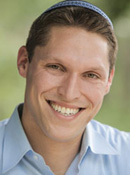 Rumors have been swirling about the rabbinic situation at Kehilath Israel Synagogue since the last week in April. Senior Rabbi Shmuly Yanklowitz, who joined the congregation in August 2012, did not lead religious services on either April 27 or May 4 and has not been seen in the metro area for a couple of weeks.
Rumors have been swirling about the rabbinic situation at Kehilath Israel Synagogue since the last week in April. Senior Rabbi Shmuly Yanklowitz, who joined the congregation in August 2012, did not lead religious services on either April 27 or May 4 and has not been seen in the metro area for a couple of weeks. After 25 years as the Jewish community’s central address, the Jewish Community Campus has a new leader at the helm.
After 25 years as the Jewish community’s central address, the Jewish Community Campus has a new leader at the helm.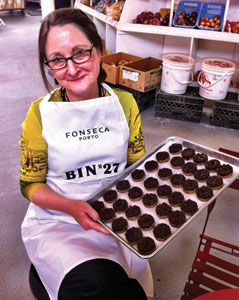 The renowned Port House of Fonseca announces the winner of its first “BIN 27 Port & Cookie Rumble.” Dr. Maureen Dudgeon of Kansas City, Mo., wins the grand prize for her Portofignos cookie creation.
The renowned Port House of Fonseca announces the winner of its first “BIN 27 Port & Cookie Rumble.” Dr. Maureen Dudgeon of Kansas City, Mo., wins the grand prize for her Portofignos cookie creation.
 I wear my overalls
I wear my overalls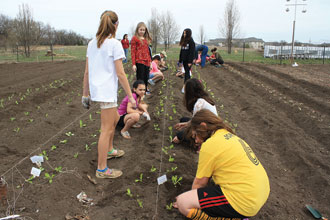 The garden has three planting seasons and produces such crops as lettuce, beets, Swiss chard, onions, potatoes, spinach, peppers and tomatoes. In a year or two it will produce apples and pears as well. Eight semi-dwarf apple and pear trees were planted in April. They are expected to bear fruit over a span of 25 to 30 years and yield about 12,000 pounds of fruit. Kaplan said it should take a year or two before they bear fruit and will be good producers by years four and five. “We hope, someday, to have an entire orchard,” Kaplan said.
The garden has three planting seasons and produces such crops as lettuce, beets, Swiss chard, onions, potatoes, spinach, peppers and tomatoes. In a year or two it will produce apples and pears as well. Eight semi-dwarf apple and pear trees were planted in April. They are expected to bear fruit over a span of 25 to 30 years and yield about 12,000 pounds of fruit. Kaplan said it should take a year or two before they bear fruit and will be good producers by years four and five. “We hope, someday, to have an entire orchard,” Kaplan said. The battle for women’s rights in Israel has been making so much news recently it’s hard to keep track of the very latest. The woman who’s been at the forefront of this battle for many years now, Anat Hoffman, will be in Kansas City to talk about this and other issues on May 17, 18 and 19. (For details, see below.)
The battle for women’s rights in Israel has been making so much news recently it’s hard to keep track of the very latest. The woman who’s been at the forefront of this battle for many years now, Anat Hoffman, will be in Kansas City to talk about this and other issues on May 17, 18 and 19. (For details, see below.)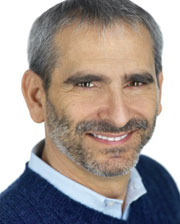 According to Chabad.org, every year on the holiday of Shavuot we renew our acceptance of G‑d’s gift and G‑d “re-gives” the Torah to us.
According to Chabad.org, every year on the holiday of Shavuot we renew our acceptance of G‑d’s gift and G‑d “re-gives” the Torah to us. The Jewish community was buzzing last week when people learned that a popular DJ in the community who is a youth soccer coach in Lee’s Summit was accused of making child pornography. Joel White was charged in U.S. District Court Tuesday, April 23, with producing child pornography by secretly videotaping members of his soccer team and was refused bond.
The Jewish community was buzzing last week when people learned that a popular DJ in the community who is a youth soccer coach in Lee’s Summit was accused of making child pornography. Joel White was charged in U.S. District Court Tuesday, April 23, with producing child pornography by secretly videotaping members of his soccer team and was refused bond.